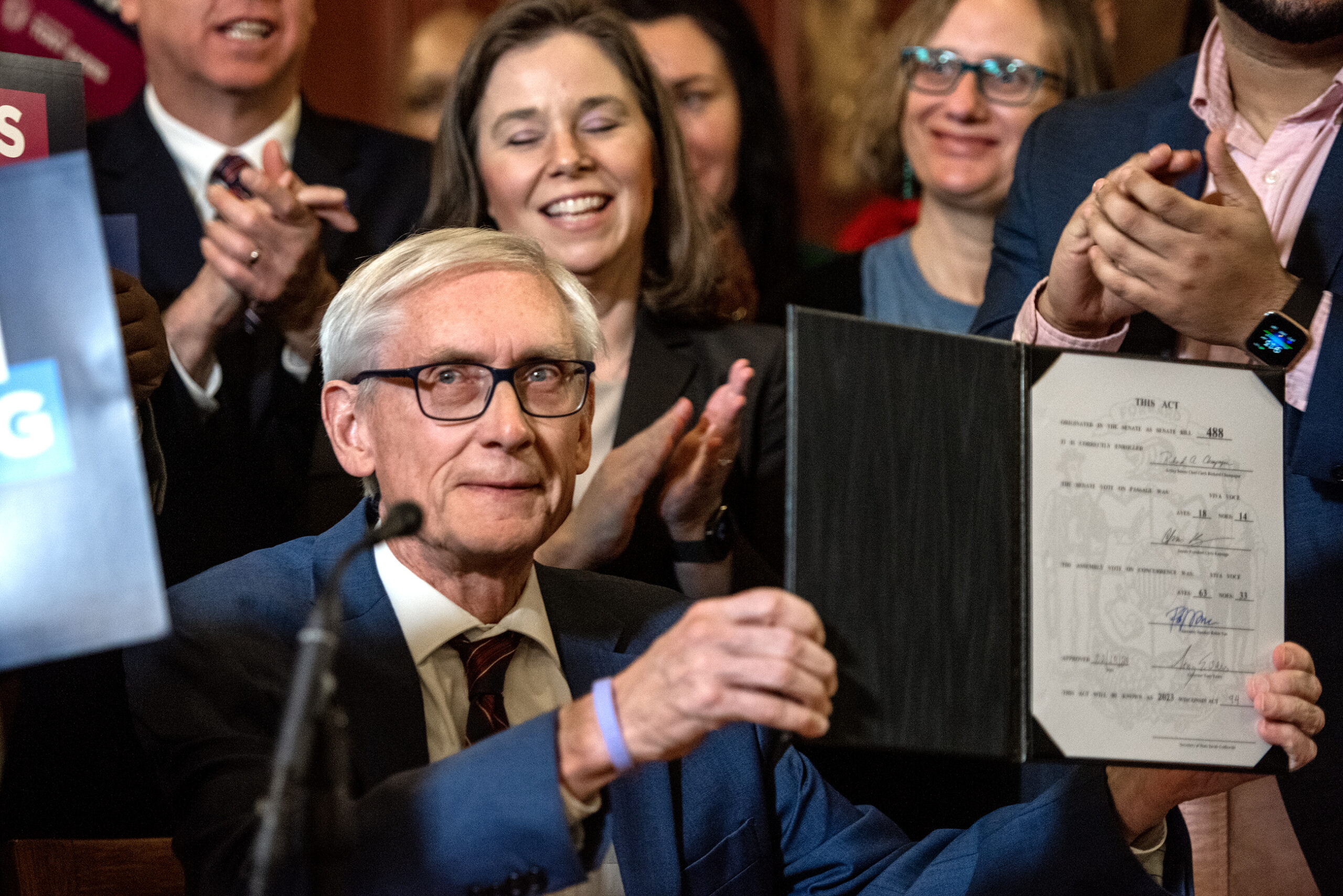Senate Republicans voted to override nine of Gov. Tony Evers’ vetoes Tuesday, rekindling fierce debates over partisan issues with the 2024 election on the horizon.
Among the bills that Evers had vetoed was one that would spell out how to spend $125 million to combat PFAS, a requirement to include people’s citizenship status on their voter IDs and a cap on the state’s wolf population.
Republicans had signaled a day earlier they could take up dozens of overrides, arguing that Evers was stopping important legislative changes from going through. They ultimately brought forward nine, each of which was passed on pure party lines, indicating the heightened partisan nature of the bills.
News with a little more humanity
WPR’s “Wisconsin Today” newsletter keeps you connected to the state you love without feeling overwhelmed. No paywall. No agenda. No corporate filter.
Republicans hold a two-thirds majority in the Senate, so the party-line votes on each bill amounted to a successful override in that chamber. For the overrides to go through in the full Legislature — thus enacting the vetoed bills into law despite Evers’ objection — they would also have to pass by a similar threshold in the the Assembly. Republicans there are two votes short of a two-thirds majority, and it’s not clear whether they will be brought to the floor at all.
On Monday, Sen. Howard Marklein, R-Spring Green, said this would be Senate Republicans’ final attempt at moving these bills through this session. Several have passed and been vetoed in previous sessions.
PFAS, wolves and voter IDs
The parties have been at odds for months over how to use $125 million set aside set aside during last year’s budget process to clean up PFAS, often called forever chemicals. Republicans passed a bill to deal with the funding, which Evers vetoed, arguing it lacked key provisions and impeded regulators’ authority.
Senate Republicans’ veto override was their latest push in that disagreement over how state government should spend the funds. On Tuesday, Sen. Mary Felzkowski, R-Tomahawk, called the dispute a “political chess game.”
Democrats argue that the Legislature’s budget committee can release the funds without passing a separate bill, and Evers has threatened a lawsuit over the PFAS holdup.
Lawmakers also revisited a heated debate over the state wolf population. The GOP bill would order state wildlife regulators to set a statewide population goal for wolves. In his veto message, Evers argued that would limit the Department of Natural Resources’ ability to manage wildlife and set strategies according to scientific, tribal, environmental and sportsmen expertise.
Republicans argued Tuesday that Madison Democrats were insufficiently concerned about the plight of rural people.
Republicans also re-upped a push to include people’s citizenship information on drivers’ licenses in what Sen. Dan Knodl, R-Germantown, described as a way of ensuring that non-citizens don’t vote.
Sen. Mark Spreitzer, D-Beloit, said that it is already illegal — and unconstitutional — for non-citizens to vote, and that the state has existing protections in place.
“The other thing that (the bill) will do is subject ordinary Wisconsinites to potential discrimination in their everyday lives,” he said.
Assembly Speaker Robin Vos, R-Rochester, has yet to say whether his chamber will also return to Madison to attempt veto overrides. Because Republicans there are just shy of a two-thirds supermajority, they would need help from Democrats in any override votes. Assembly Republicans could also plausibly schedule override votes on days when Democrats are expected to be absent.
In what has become an escalating back-and-forth between the governor and legislative Republicans, Evers spokesperson Britt Cudaback blamed the GOP for standing in the way of funding for issues like PFAS.
“Gov. Evers urges Republican lawmakers to stop obstructing the release of nearly $200 million to fight PFAS contaminants, improve kids’ reading, and respond to hospital closures in Western Wisconsin,” Cudaback said in a written statement.
Wisconsin Public Radio, © Copyright 2025, Board of Regents of the University of Wisconsin System and Wisconsin Educational Communications Board.







